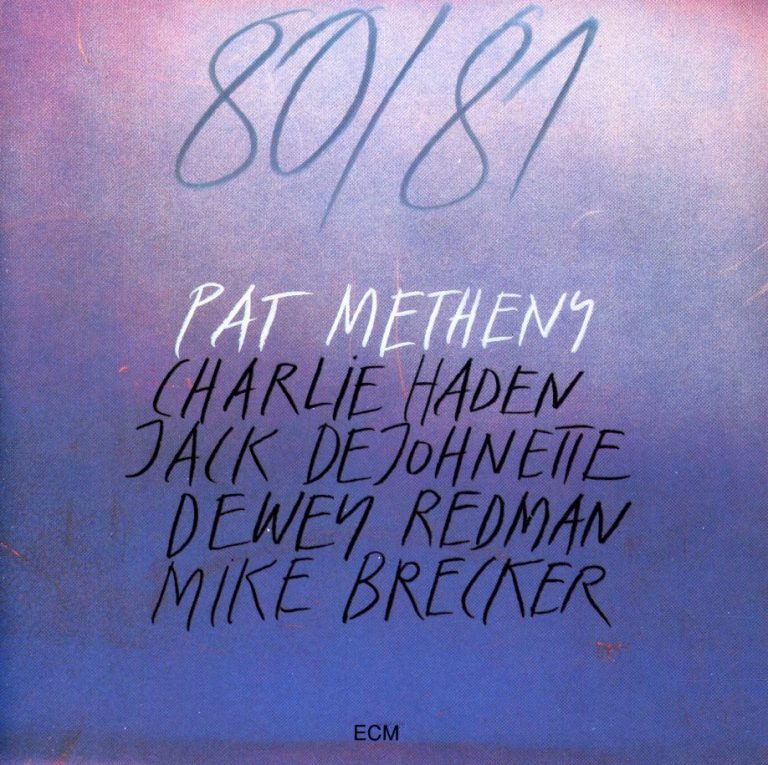Late 1979 to early 1980 was a key period in the development of guitarist/composer Pat Metheny. His profile was building courtesy of an all-star tour with Joni Mitchell (alongside Michael Brecker and Jaco Pastorius) and near-constant live playing with his Group, whose ECM album “American Garage” was also released to strong sales at the end of 1979.
“80/81”, Metheny’s ambitious fourth solo record, represented somewhat of a breakthrough. On his website, he even went as far as to describe it as “magical” and “life-changing”. Recorded between 26 and 29 May 1980 at Rainbow Studios in Oslo, the album featured Brecker, Dewey Redman and bassist Charlie Haden, the latter both alumni of Keith Jarrett’s American Quartet. Joining them was the exemplary, expressive Jack DeJohnette, who had almost become ECM’s house drummer during the late 1970s.

PAT METHENY 80/81
Available to purchase from our US store.Metheny reported a great atmosphere in the studio, despite the fact that Brecker was in considerable physical and spiritual pain, as outlined in Bill Milkowski’s “Ode To A Tenor Titan” book. Remarkably, most of “80/81” was recorded during the group’s first completed recording session.
“Two Folk Songs” stitched together two very different grooves, the first featuring Metheny’s almost country-style acoustic strumming and Brecker’s bracing, uncharacteristically “out” solos (esteemed writer Gary Giddins compared them to Albert Ayler) which still deliver thrills and chills, while DeJohnette grooves hard before unleashing one of his finest solos on record. Haden’s own “Folk Song” then nods to “Old Joe Clark”, an American roots tune usually played on a banjo or fiddle. The bassist had also quoted from it twenty years earlier on Ornette Coleman’s epochal track “Ramblin’”.
Meanwhile Metheny’s title track, directly inspired by Jarrett via Coleman, featured a bebop-style head which brought out the very best in Redman, a performance which stunned the guitarist and band leader. Other tracks recorded during that first session were the sumptuous ballad “The Bat” – later updated for The Metheny Group’s “Offramp” album – and the Ornette-ish “Pretty Scattered”, an altered blues with an intriguing stop-start structure, originally written for saxophonist Bob Berg. “Every Day (I Thank You)” became the centrepiece of “80/81” – a moving ballad featuring arguably the most emotive playing of Brecker’s entire career.

After an initial playback, Metheny and producer Manfred Eicher were stunned at what had been achieved in such a short period of time. A decision was quickly made to expand the album to a double – a rarity for ECM. The final three tunes then came about almost by accident.
“Open” was a group composition, a joyous free excursion which perfectly distilled Redman and Brecker’s contrasting styles. Haden suggested trying Coleman’s “Turnaround”, which Metheny reportedly recorded whilst reading the sheet music (also listen out for Haden excitedly heralding DeJohnette at the end of the track – amazingly, “80/81” was the first time these two giants had recorded together). Metheny’s memorable solo closer (with one overdub) “Goin’ Ahead” was recorded quickly on the studio’s battered old acoustic guitar as a quick guide to show the band the basic contours of the composition, but everyone persuaded Pat to leave it exactly as it was.
“80/81” was a triumph for all concerned and a beautiful-sounding record too, courtesy of Jan Erik Kongshaug’s meticulous engineering. The impressive package was completed by Barbara Wojirsch’s striking cover design.
The album became a commercial and critical success, peaking at #4 on the Billboard Jazz Chart of 6 December 1980, sitting incongruously alongside Grover Washington Jr. Spyro Gyra, Wilton Felder and George Benson. Downbeat called it a “triumph” and the German critics voted it Jazz Record of the Year.

PAT METHENY 80/81
Available to purchase from our US store.Read on… Tone: How the Guitar Found its Jazz Voice
Matt Phillips is a London-based writer and musician whose work has appeared in Jazzwise, Classic Pop, Record Collector and The Oldie. He’s the author of “John McLaughlin: From Miles & Mahavishnu To The 4th Dimension”.
Header image: Pat Metheny. Photo: Pete Cronin/Redferns via Getty.


